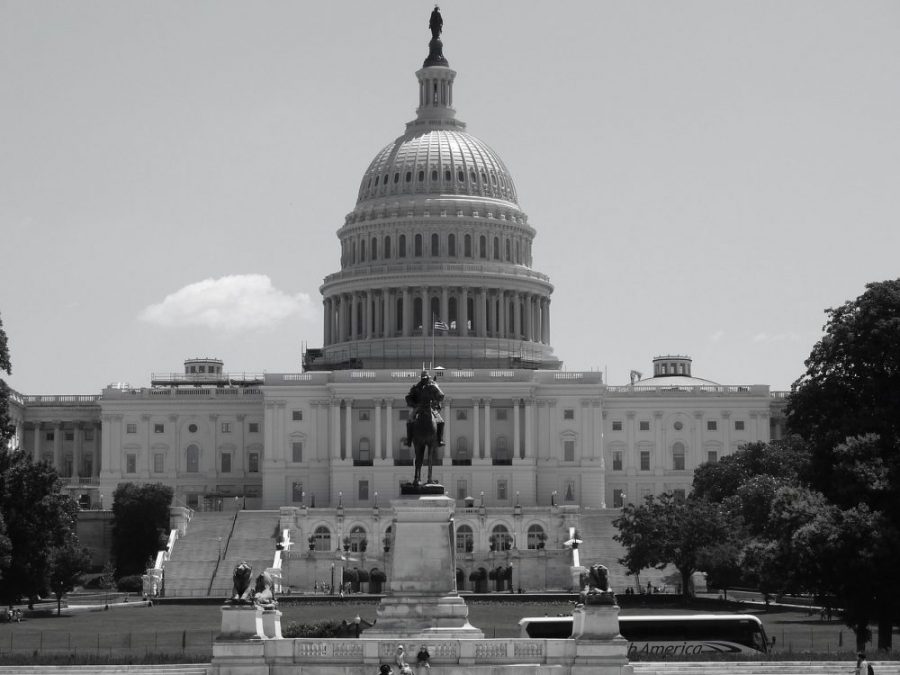President Trump’s schedule (EST):
2:30 PM: Hosts a roundtable discussion on border security and safe communities with state, local and community leaders at the White House.
The House will pass an Interior-Environment appropriation, H.R.266, and the Senate’s federal pay restoration bill, S.24, before leaving town early this afternoon. The Senate remains paralyzed as Democrats block any votes until Majority Leader McConnell (R-KY) allows votes on House bills to fund the government. There’s no end in sight for the government shutdown as it’s duration moves into record territory.
“Trump Cancels Davos Trip, Digs In on Border-Wall Funding.” Yesterday’s Wall Street Journal article led with:
WASHINGTON—President Trump on Thursday canceled a trip to the World Economic Forum summit in Davos, Switzerland, and reasserted his willingness to declare a national emergency to pay for the border wall as the partial government shutdown neared the longest in history.
“Probably I will do it, I would almost say definitely,” Mr. Trump said when asked whether he would consider declaring the emergency.
Mr. Trump, who spoke as he prepared to leave for the southern border town of McAllen, Texas, added that he would prefer to compromise with Democrats on funding.
“The easy route for me would have been to call a national emergency and do it,” he said. “If we don’t make a deal, I would say it would be very surprising to me that I would not declare a national emergency and just fund it through the various mechanisms.”
“National Emergency” funding for The Wall? Debate continues within the White House over how to fund The Wall without congressional approval. Such a move would provoke court challenges, but they probably wouldn’t succeed. Past presidents have frequently used emergency powers for military and anti-terrorism construction. However, transferring funds from disaster relief (Washington Post article) or military construction (American Action Forum analysis and commentary) would have their own negative consequences.
“The Census Bureau says work on the 2020 count can go on for weeks. Experts say they have their doubts.” Yesterday’s Washington Post article led with:
The Census Bureau, operating with sharply reduced staffing, says it has enough money to continue preparing for the 2020 decennial survey for six to eight weeks, but experts say that estimate is optimistic given the complexity of the work at a crucial time in the run-up to the count.
In the meantime, dozens of other surveys the bureau conducts have been stopped, leading to information gaps that could destabilize the U.S. economy, economists say.
The bureau is relying on $1.056 billion in forward funding from the fiscal 2018 bill, which can be used only for 2020 Census activities and not for other work, to last into mid to late February. …
The lack of data could already be hurting the country, said Maurine Haver, CEO and founder of Haver Analytics, an economic information company. “You have this trade war going on, and we’re not going to have any trade data from our side, whereas China, they’re collecting their data, and they know exactly where they stand,” she said.
Overall, she said, “more uncertainty tends to lead business people to reduce hiring and reduce investment.”
Shutdown aside, the bureau is facing a raft of other challenges. It’s funding for fiscal 2019 is still undecided, and its newly confirmed director, Steven Dillingham, who was sworn in Monday, inherits a half-dozen lawsuits challenging the government’s addition of a citizenship question to the 2020 count.
I’m very concerned about the chaotic and underfunded road to the 2020 Census.
“Xi Jinping’s Top Trade Aide to Visit U.S. for Talks This Month, Shutdown Permitting.” Last night’s Wall Street Journal article led with:
BEIJING—China and the U.S. are moving ahead with plans to hold a round of higher-level talks to resolve their continuing trade conflict, with President Xi Jinping’s economic-policy captain scheduled to visit Washington in late January.
For now, Vice Premier Liu He is planning to meet with his U.S. counterparts including U.S. Trade Representative Robert Lighthizer and Treasury Secretary Steven Mnuchin for negotiations on Jan. 30 and Jan. 31, according to people briefed on the matter. These people caution that the plan could be delayed by the partial U.S. government shutdown.
The next round of talks would follow midlevel trade talks held in Beijing from Monday to Wednesday this week. Negotiators from both sides, led by Deputy U.S. Trade Representative Jeffrey Gerrish and Chinese Vice Commerce Minister Wang Shouwen covered a range of issues including more Chinese purchases of U.S. products, further opening of China’s markets to U.S. businesses, better protection of American intellectual property, and a reduction in Chinese subsidies to domestic firms.
U.S. negotiators also pressed Beijing to devise ways to ensure that it will make good on its promises. U.S. officials have complained about Beijing’s poor follow-up record in the past, noting that barriers for foreign businesses in China have actually increased over the years.
The people briefed on the matter described the three days of negotiations as cordial and said both sides made progress on issues related to purchases of American goods and services and greater market access. But no breakthrough was achieved in addressing more challenging issues, such as a reduction in Chinese subsidies, these people said.
I expect a phased deescalation of U.S.-China trade tensions before the March 1 deadline.
“Most of what you pay for a ‘made in China’ product goes to U.S. workers and businesses.” This morning’s Washington Post Wonkblog led with:
About 56 percent of what you pay for something “made in China” goes to U.S. workers and companies, on average, according to a new analysis released by the Federal Reserve Bank of San Francisco.
The rules are complicated, but “made in China” roughly indicates a good was assembled in a Chinese factory. Its parts, design, marketing and distribution may have come from anywhere — and that “anywhere” is often the United States.







